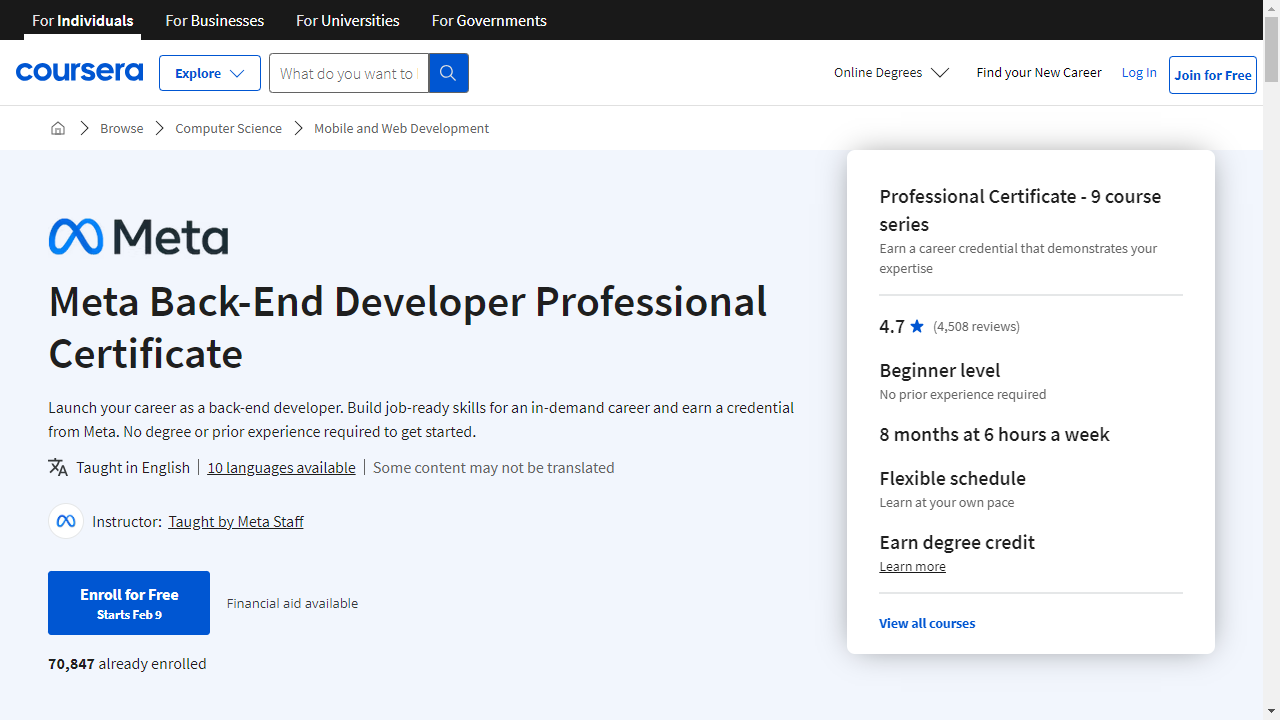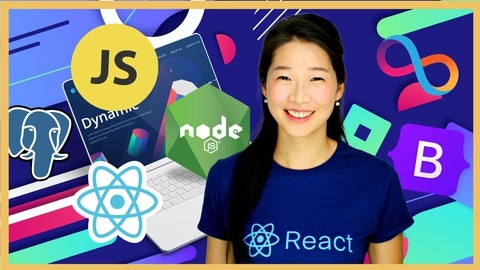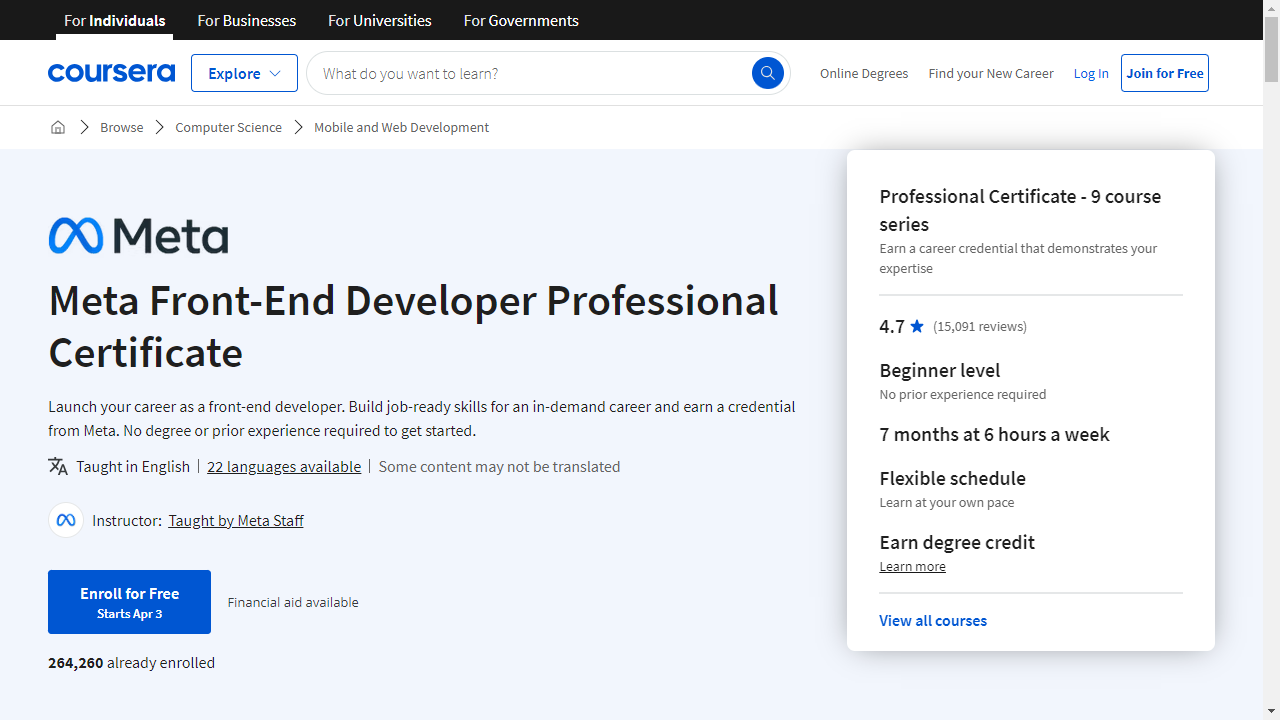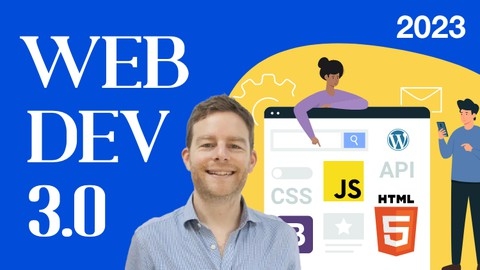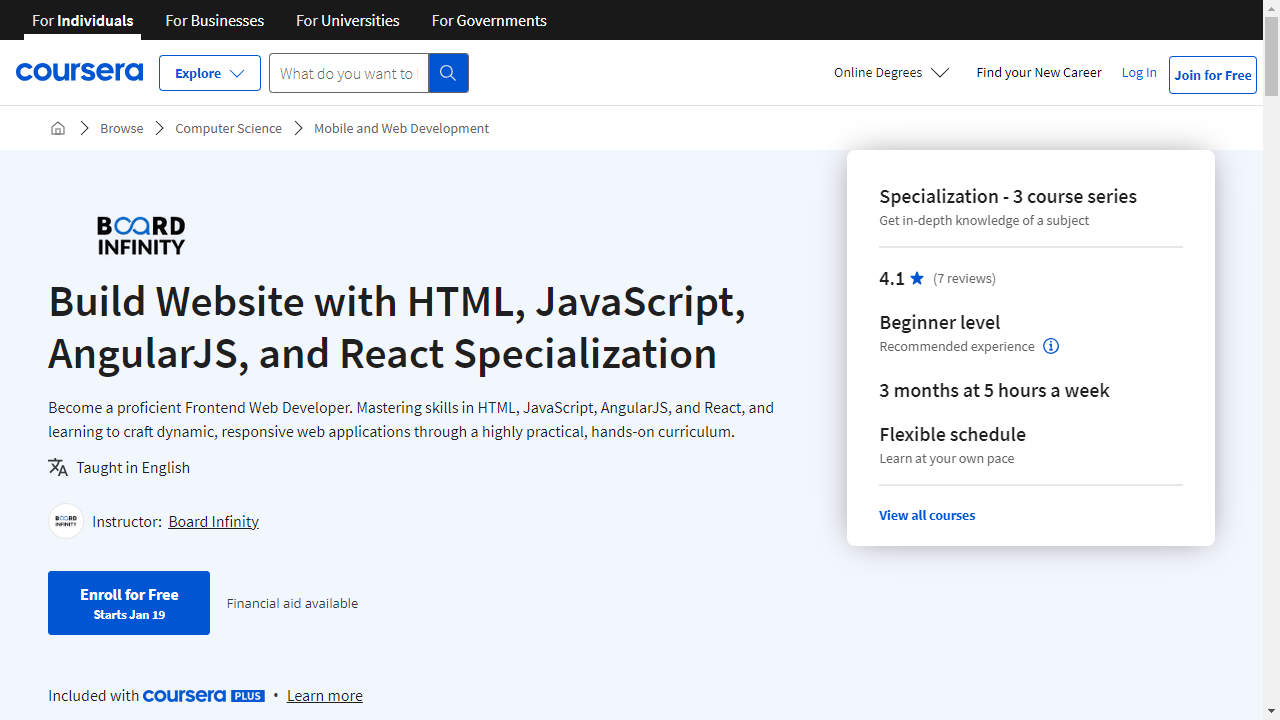Web development is the art and science of building websites and web applications.
It encompasses a wide range of skills, from designing user interfaces and writing code to managing databases and deploying applications.
By learning web development, you can create interactive and engaging online experiences, build your own websites and applications, and even pursue a rewarding career in the tech industry.
The sheer number of web development courses available can make it challenging to find one that suits your learning style, goals, and experience level.
You want a course that covers the essential skills, provides hands-on practice, and keeps you engaged throughout the learning process.
For the best web development course overall, we recommend the Front End Web Developer Nanodegree offered by Udacity.
This comprehensive program covers everything from HTML, CSS, and JavaScript to advanced frameworks like React.
You’ll build real-world projects, receive personalized feedback, and gain valuable skills to kickstart your web development journey.
While the Front End Web Developer Nanodegree is our top pick, many other excellent web development courses cater to specific needs and preferences.
Keep reading to discover our recommendations for beginners, intermediate learners, and those interested in specialized areas like front-end, back-end, or full-stack development.
Front End Web Developer Nanodegree
Provider: Udacity
In this Nanodegree, you will begin your journey by mastering the basics of web development: HTML and CSS.
You will learn how to structure websites and style them using techniques like Flexbox and CSS Grid, ensuring your designs adapt seamlessly to any screen size.
To put these skills into practice, you will build your own personal blog website.
Next, you will dive into the world of JavaScript, the language that brings websites to life.
You will learn how to manipulate the Document Object Model (DOM) to create dynamic content, handle user interactions, and make your websites more engaging and interactive.
A landing page project will test your ability to apply these skills.
You will then explore the world of web APIs, learning how to build web applications that retrieve data from external services and handle asynchronous operations smoothly.
You will work with Node and Express to create web servers, handle HTTP requests, and build a dynamic Weather Journal App that interacts with real-time data.
The Nanodegree also equips you with industry-standard build tools like Webpack and Sass, streamlining your development process.
You will delve into advanced concepts like Natural Language Processing, building a news article evaluator that showcases your ability to integrate machine learning techniques.
Finally, you will put all your skills to the test by developing a comprehensive Travel App, a testament to your front-end development abilities.
To top it off, you will receive career guidance on refining your LinkedIn and GitHub profiles, boosting your presence in the job market.
Meta Back-End Developer Professional Certificate
Provider: Coursera
This Meta Back-End Developer Professional Certificate on Coursera will give you a solid foundation if you’re thinking about becoming a web developer.
You’ll begin with the basics of web development, learning HTML to create webpages and CSS to style them.
You’ll even dive into UI frameworks like React and Bootstrap to see how they can simplify building interactive user experiences.
Next, you’ll explore the world of programming with Python.
You’ll learn how to think like a programmer and use code to solve problems, work with data structures, and understand the core concepts of object-oriented programming.
You’ll also learn about version control using Git and GitHub, an essential skill for collaborating with other developers on projects.
Databases are a crucial part of back-end development, so you’ll learn how to use SQL to interact with a MySQL database, storing, managing, and retrieving data.
You’ll then level up your skills by learning how to build web applications with the Django framework.
You’ll use your Python knowledge to create dynamic web applications, handle user interactions, and implement security best practices.
APIs are the backbone of modern web applications, and you’ll dive deep into building them with Django, exploring REST architecture and best practices for testing and documentation.
To solidify your full-stack development skills, you’ll work on a project where you’ll use everything you’ve learned to build a complete web application from scratch.
You’ll connect your Django backend to a MySQL database and create a front-end using HTML, CSS, and JavaScript.
You’ll finish the program by preparing for coding interviews, learning about data structures, algorithms, and how to impress potential employers.
The Complete 2024 Web Development Bootcamp
Provider: Udemy
This web development bootcamp starts with the front end.
You’ll begin by learning HTML, CSS, and JavaScript.
You’ll discover how to use these languages to build websites.
As you progress, you’ll explore more advanced CSS techniques like Flexbox and Grid for creating visually appealing and responsive web pages.
You’ll then dive into backend development with Node.js and Express.js.
You’ll use these technologies to create dynamic web applications.
This bootcamp teaches you how to use EJS for templating, enabling you to build dynamic web pages that adapt to user-specific content.
You’ll also explore APIs, which are essential for enabling communication between different applications.
The course doesn’t neglect data management either - you’ll learn how to work with databases, including SQL and PostgreSQL.
You will discover how to use Git and GitHub for version control, a critical skill for collaborating with other developers.
The course introduces Web3 and decentralized applications (DApps).
You’ll learn about Dfinity and the Internet Computer, a platform specifically designed for building DApps.
This section will teach you the Motoko programming language.
Finally, you’ll explore React.js.
You’ll discover React Components and how to use them to create interactive user experiences.
Java Web Developer Nanodegree
Provider: Udacity
This Java Web Developer Nanodegree prepares you for software engineering jobs at companies like Google and Amazon.
You learn enterprise-scale back-end development using Java, a popular language for large companies.
The program uses a hands-on approach.
You learn to build web applications with Spring Boot, a popular framework.
You’ll use Spring MVC and Thymeleaf to create web pages.
You also learn how to work with databases using JPA and secure your applications.
You will build a file-sharing service called SuperDuperDrive to practice these skills.
You then move on to web services and APIs.
You discover how to build RESTful APIs and GraphQL APIs, which are important for exchanging data.
You learn about microservices, a way to build applications in smaller parts.
To apply your knowledge, you build a backend system for a car website.
You then explore data storage.
You learn how to manage data in large applications and connect to various databases.
You also learn how to store data without using JPA, giving you a well-rounded understanding of data management.
You demonstrate these skills by building Critter Chronologer, an application showcasing data persistence.
You finish the program by learning about security and DevOps.
You learn how to secure your applications using authentication, authorization, testing, and logging.
You will use Splunk, a tool for analyzing logs.
You also explore CI/CD, a practice for automating software development.
You apply all of this knowledge while building an e-commerce application.
Throughout the program, you use IntelliJ, a popular code editor, and learn how to improve your LinkedIn and GitHub profiles for job searching.
Meta Front-End Developer Professional Certificate
Provider: Coursera
This Meta Front-End Developer Professional Certificate on Coursera equips you with the skills necessary to thrive as a front-end web developer.
The program guides you through a comprehensive curriculum, beginning with the foundations of HTML and CSS.
You will create your first webpages, learning how to structure content and apply styling.
As you progress, you will explore the dynamic capabilities of JavaScript, making your webpages interactive and engaging.
You will delve into the world of version control using Git and GitHub, collaborating on projects and managing code like a seasoned developer.
The program goes deeper, teaching you how to build responsive layouts that adapt seamlessly to any device using Bootstrap.
You will master debugging techniques, ensuring your code is free of errors.
React, a powerful JavaScript library, takes center stage as you learn to build dynamic user interfaces.
You will create reusable components, crafting interactive web applications with ease.
Advanced React concepts, like fetching data from servers and using hooks, will become second nature.
You will even learn how to test your applications, guaranteeing they are robust and reliable.
The program doesn’t stop there.
You will discover the principles of UX design, learning to empathize with users and create intuitive, user-friendly interfaces.
Using Figma, you will design wireframes and prototypes, bringing your design ideas to life.
Finally, you will put your skills to the test in a capstone project, building a real-world web application that showcases your abilities to potential employers.
The Complete Web Developer Course 3.0
Provider: Udemy
This web development course equips you with the skills needed to build websites and web applications from the ground up.
You begin with the basics of web development, mastering languages like HTML 5, CSS 3, and JavaScript.
With HTML 5, you learn how to structure webpages, incorporating elements like headers, paragraphs, lists, images, forms, and tables.
CSS 3 empowers you to style these elements, controlling colors, fonts, layouts, and crafting visually appealing designs using techniques like flexbox.
You then breathe life into your creations with JavaScript, learning how to add interactivity through variables, loops, functions, and event handling.
The course then introduces you to powerful tools and frameworks that streamline web development.
You learn Bootstrap 5, which simplifies responsive design with its grid system and pre-built components.
jQuery, a popular JavaScript library, comes next, providing you with the ability to create animations, easily manipulate webpage elements, and enhance your website’s interactivity.
You also delve into WordPress, a widely used content management system, learning to manage themes, plugins, and craft engaging content.
You further expand your skillset by learning server-side programming with PHP, enabling you to build dynamic web applications.
MySQL, a robust database management system, is also covered, teaching you how to store, manage, and retrieve data.
You then explore APIs (Application Programming Interfaces), learning to interact with external services, and fetching data from various sources, including platforms like Twitter and Wikipedia.
You even gain exposure to the Linux command line, a powerful tool for developers, and get a taste of Python, a versatile language used for various web development tasks.
You also learn how to optimize your websites for search engines, covering essential SEO concepts like keyword research, content optimization, backlink strategies, and technical SEO, enabling you to enhance your website’s visibility and reach a wider audience.
Finally, the course guides you through the fundamentals of web hosting, explaining different hosting options, domain management, and how to upload your website, ensuring a smooth transition from development to deployment.
Full Stack Web Developer Nanodegree
Provider: Udacity
In this nanodegree, you’ll begin your journey by mastering the foundations of back-end development.
You will explore the world of SQL and data modeling, discovering how to interact with databases and harness the power of SQLAlchemy to streamline your database operations using Python.
This knowledge will allow you to build your own data-driven applications, starting with a CRUD application for a fictional music venue.
You will then move on to the realm of API development with Flask, a widely-used Python framework.
You will learn how to create endpoints, construct payloads, and rigorously test your APIs, ensuring they are robust and reliable.
You will also gain expertise in API documentation, a critical skill for any developer.
Next, you’ll delve into the crucial area of Identity Access Management, where you’ll master authentication, authorization, and password security to safeguard your applications from vulnerabilities.
You will learn to think like a hacker, anticipating potential security flaws and implementing robust measures to protect your applications and user data.
A practical project in this section involves building a full-stack coffee shop application.
Finally, you’ll conquer the complexities of server deployment and containerization using industry-standard tools like AWS and Kubernetes.
This will equip you to build scalable and highly-available applications.
You will gain hands-on experience deploying your Flask applications to Kubernetes using EKS, Amazon’s managed Kubernetes service.
To solidify your knowledge, you will complete a capstone project, building a real-world application, and receive guidance on how to optimize your LinkedIn and GitHub profiles to attract potential employers.
Build Website with HTML, JavaScript, AngularJS, and React Specialization
Provider: Coursera
This specialization equips you with the skills to build websites from scratch.
You’ll start with HTML, creating the structure and content of web pages.
You’ll then use CSS and Bootstrap to style your websites, ensuring they are visually appealing and responsive across different devices.
Next, you’ll dive into JavaScript, learning to manipulate the DOM to create interactive elements like buttons and forms.
You’ll also master advanced JavaScript techniques and use jQuery to simplify DOM manipulation and enhance web page functionality.
Finally, you’ll explore powerful frameworks like React and Angular, learning to build complex web applications.
You’ll delve into React’s component-based approach, understanding concepts like components, state, and props to create dynamic user interfaces.
You’ll also explore Angular’s architecture, mastering components, modules, directives, and services to build robust and scalable web applications.
UX & Web Design Master Course: Strategy, Design, Development
Provider: Udemy
This UX & Web Design Master Course teaches you how to build a website from planning to launch.
You learn by doing, using industry-standard tools like Photoshop and Axure RP Pro.
You will first learn to define your website’s goals and conduct user research.
You discover how to organize content and create a clear structure for easy navigation.
You practice different techniques to create a navigation system that is user-friendly.
You will then dive into visual design, using timeless UI design principles to make sure your website is attractive and user-friendly.
You will use what you learn to create professional wireframes and UI designs.
Finally, you will make your website a reality using HTML, CSS, and WordPress.
You’ll gain hands-on experience building a B2B website, a blog, and an e-commerce store.
You will also use tools like CPanel and FTP to manage your website.
You’ll finish the course with the skills and confidence to build a professional website from start to finish, no matter how simple or complex.
Also check our posts on:


